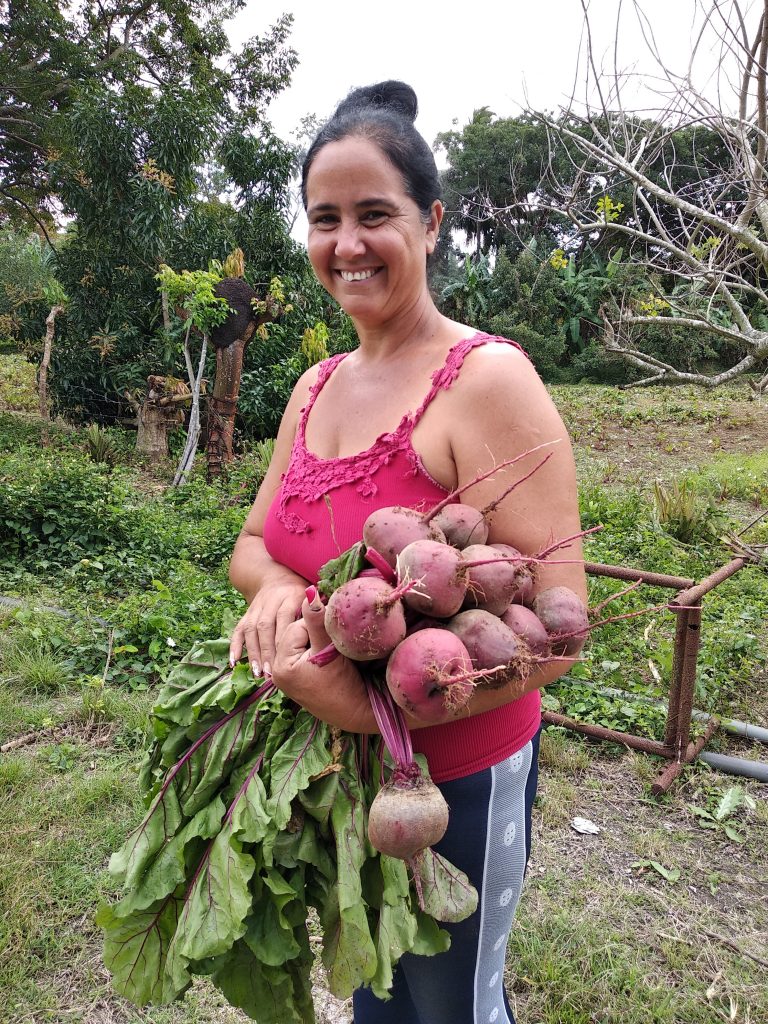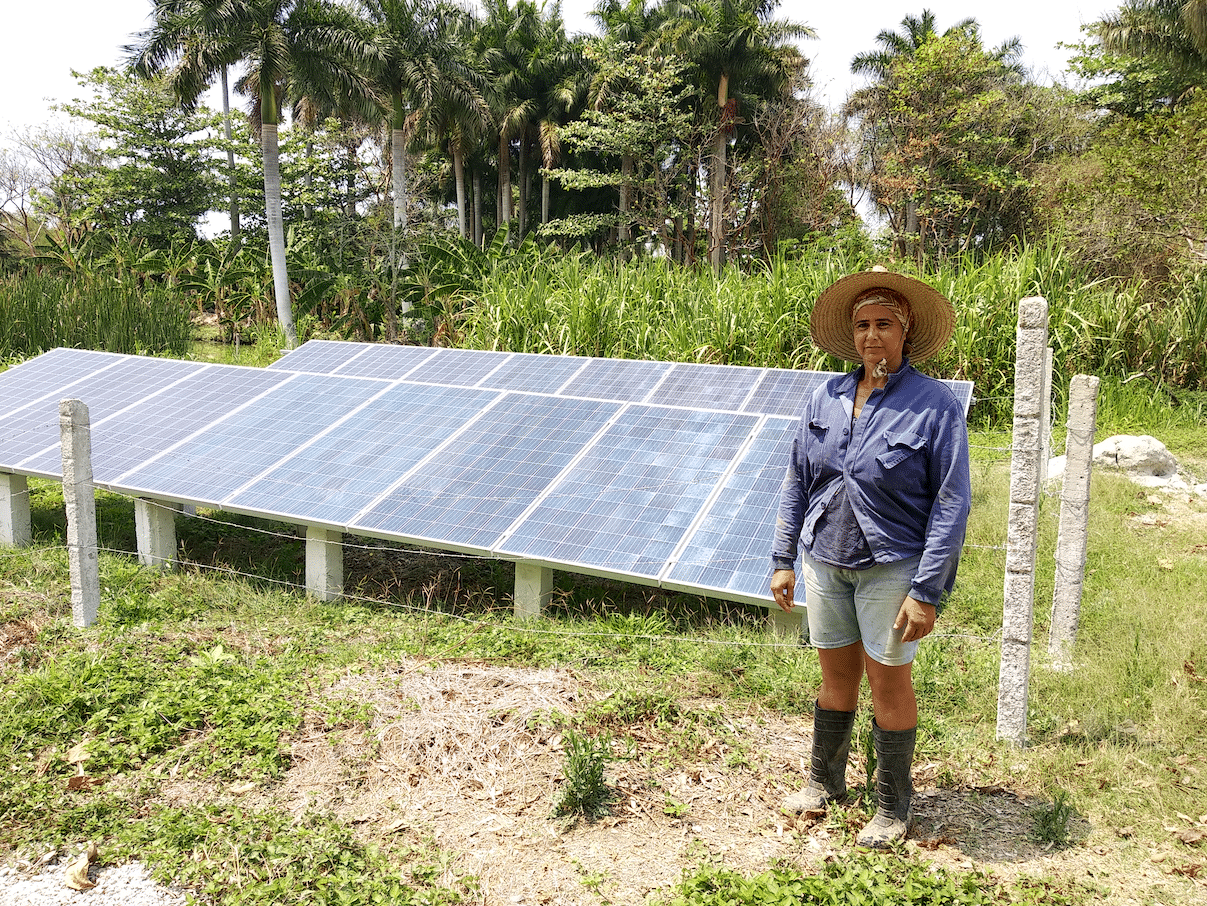Cuban Woman Food Producer Learns New Skill
Kety Díaz Padrón is a 41 year old woman and leader of her farm. She is associated with the CCS José Martí, in Guanabacoa, Havana. She lives with her husband, her 21 year old son, and her parents. She was selected to participate in PROSAM for being recognized as a high producer of vegetables. For around 20 years she has worked with her father in agriculture, which is her great passion, in addition to raising large livestock. In addition, she cares for her home and does most of the housework.
When CARE arrived at Kety’s farm in 2015, we found a smiling woman, with great desires to work, very few resources and a lot of ignorance about the cultural tasks related to the crops she produced, and few alternatives to sell her productions. Despite having a fairly large reservoir within the farm area, it was not used, since there were no means to distribute it to irrigation and animals. The land was improperly plowed and not utilized. The family produced in a small space that provided some livelihood.

From the start of PROSAM, mutual learning began. The project has supported Katy in the creation of new capacities and the realization of several of her dreams, both on the farm and in her personal development. She has learned about different technologies, gender, environment and many other topics.
PROSAM supported Kety with the installation of an irrigation system with solar panels, which allows her to reach all the arable corners of the farm and deliver water to her animals. The preparation and development of the area for its installation was carried out by her and her family.
The use of solar panels for women farm leaders offers them independence and autonomy by not depending on the purchase of diesel or the use of electricity, both with high costs and fluctuations in their stability; it lowers the costs of agricultural production, which allows them to integrate into markets with more competitive and fair prices; and frees them from the problems associated with natural disasters such as cyclones, which are very frequent in Cuba, since they can immediately begin to produce and irrigate, despite the fact that for several days there is no access to electricity or fuels.
Kety now understands the importance of correct tillage of the land, the incorporation of various crops and their diversification, and the use of biological means for pest management. She is in the process of reorganizing the farm with the help of the cooperative and the municipal government. Today, she is considering incorporating freshwater fish farming into the reservoir as a means of producing more food and improving her income. In addition, with the help of PROSAM, she is improving her home’s access to drinking water.
Kety is happier today, welcoming visitors with a huge smile, and continuing to work on her land. She has gained the necessary skills to become a successful entrepreneur.
En español
Kety Díaz Padrón es una mujer de 41 años, líder de su finca, perteneciente a la CCS José Martí del municipio Guanabacoa, en La Habana. Vive con su esposo, su hijo de 21 años, y sus padres. Llegó a PROSAM por ser reconocida como alta productora de hortalizas y vegetales, porque hace alrededor de 20 años trabaja junto a su padre en la agricultura, que es su gran pasión, además de la cría de ganado mayor. Además, atiende su hogar y realiza la mayoría de las labores domésticas.

Cuando llegamos a su finca en el 2015, nos encontramos con una mujer sonriente, con muchas ganas de trabajar, muy pocos recursos y mucho desconocimiento sobre las labores culturales relacionadas con los cultivos que producía, y pocas alternativas para comercializar sus producciones. A pesar de disponer de un embalse bastante grande dentro del área de la finca, esta agua no se utilizaba, por no existir medios para distribuirla al riego y a los animales. La tierra estaba arada incorrectamente y varios espacios no se utilizaban. La familia producía en un pequeño espacio que le proporcionaba algunos medios de vida.
A partir de la llegada de PROSAM comenzó el aprendizaje mutuo, son muchas las experiencias que puede transmitir Kety. El proyecto la ha apoyado en la creación de nuevas capacidades y la realización de varios de sus sueños, tanto en la finca como en su desarrollo personal. Ha aprendido sobre diferentes tecnologías, género, medio ambiente y muchos otros temas.
PROSAM la apoyó con la instalación de un sistema de riego con paneles solares, que le permite llegar a todos los rincones cultivables de la finca y entregar agua a sus animales. La preparación y puesta a punto del área para su instalación corrió a cargo de ella y su familia. El uso de paneles solares para mujeres líderes de finca les ofrece independencia y autonomía al no depender de la adquisición de diesel o del uso de electricidad, ambos con altos costos y fluctuaciones en su estabilidad; disminuye los costos de la producción agrícola, que les permite integrarse a los mercados con precios más competitivos y justos; y las libera de los problemas asociados a los desastres naturales como ciclones, muy frecuentes en Cuba, ya que inmediatamente pueden comenzar a producir y regar, a pesar de que por varios días no exista acceso a electricidad o a combustibles, y así posicionarse rápidamente en los mercados.
Kety comprendió la importancia de un correcto laboreo de la tierra, de la incorporación de varios cultivos y su diversificación, del uso de medios biológicos para el manejo de plagas. Se encuentra en proceso de reorganización de la finca y con ayuda de la CCS y del gobierno municipal, ha logrado manejar los árboles que circundan el perímetro. Hoy está pensando en incorporar la cría de peces de agua dulce en el embalse, como medio para producir más alimentos y mejorar sus ingresos. Además, con la ayuda de PROSAM está mejorando el acceso de su vivienda al agua potable.
Kety hoy es más feliz, continúa siempre recibiendo a los visitantes con una inmensa sonrisa, y continúa con inmensos deseos de trabajar y producir. Ha ganado en capacidades para ser una emprendedora exitosa. Tiene grandes retos, entre ellos: mejorar la comercialización de sus producciones y lograr una mayor contribución de su familia en las labores de cuidado del hogar.
